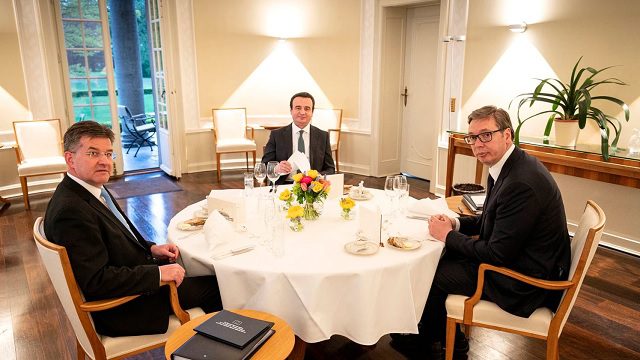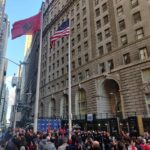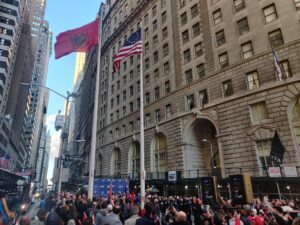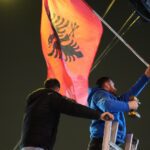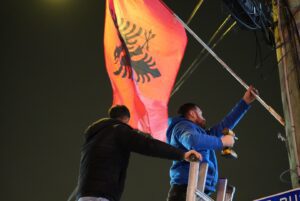After more than a year, the Prime Minister of Kosovo, Albin Kurti, and the President of Serbia, Aleksandar Vucic, will meet in Brussels on August 18, within the dialogue mediated by the European bloc. Despite the fact that the agenda has not yet been made public, the meeting is expected to focus on reducing tensions between the two countries.
On July 31 and August 1, local Serbs in the north of Kosovo blocked the roads leading to the two border crossings – Jarinje and Bernjak – that connect Kosovo and Serbia. The barricades were erected to oppose the two decisions of the Government of Kosovo, related to Serbian license plates and documents.
However, the fact that more than a year has passed since the last round of dialogue, at the highest political level, is seen by some diplomats in Brussels as evidence that this process has not gone according to the expected pace and there have been major delays.
The reasons why Kurti and Vucic have not held meetings within the framework of the dialogue are related to what the EU has called “lack of readiness and will of the parties to achieve concrete progress in the dialogue”.
The head of EU diplomacy, Josep Borrell, declared a few months ago that he would not call any high-level meeting, as long as he does not see that there is a will of the parties to achieve results in such meetings.
At this time, there have been meetings in Brussels – also rare – between the teams of chief negotiators, but the concrete results from such meetings have been small. At the last dialogue meeting at the level of chief negotiators, on June 21, the parties reached an agreement on the roadmap for the implementation of the Energy Agreement. However, the implementation of this agreement is encountering obstacles and the deadlines for its implementation are not being respected.
The agenda is not known
The EU has not yet announced the agenda for the August 18 meeting. However, Kurti has stated that in this meeting he will not talk about the decisions of the Government of Kosovo, about Serbian license plates and documents.
Meanwhile, in Belgrade they insist that the topic of the dialogue should be the creation of the Association of municipalities with a Serbian majority.
Serbia demands that Kosovo implement the agreements reached in 2013 and 2015, within the dialogue. However, the Government of Kosovo has declared against a mono-ethnic association, while recently, the envoy of the United States for the Western Balkans, Gabriel Escobar, has expressed the position that discussions should begin for the Association, but it should not create a “state within the state”.
Diplomats in Brussels say that the purpose of the August 18 meeting is to reduce tensions and avoid an eventual escalation of the situation. This meeting, according to the diplomats, aims to prepare the ground for more frequent meetings at a high level, in order for Kosovo and Serbia to make progress towards reaching a comprehensive agreement for the normalization of relations.
“The EU expects the leaders to discuss these challenging topics at the next high-level meeting in the framework of the dialogue, invited by the High Representative, Borrell, between the Prime Minister of Kosovo, Albin Kurti, and the President of Serbia, Aleksandar Vucic , it is said in the last communique of the block.
However, the parties have opposite attitudes not only about the agreements reached, but also about the purpose of the dialogue. Kosovo insists that the dialogue should focus on mutual recognition, while Serbia seeks a compromise solution.
The EU puts the responsibility on the parties
Meanwhile, in the European bloc, in every question related to failures in dialogue or in the implementation of agreements reached, the responsibility is transferred to the parties. Officials in the EU constantly say that “it is up to the parties to reach agreements and implement them, while the role of the EU is not to impose, but to facilitate these agreements and their implementation”.
For months, the EU’s special envoy for dialogue, Miroslav Lajcak, had been trying to prepare for a high-level meeting, but he had no success. Such a meeting was expected to take place in July and was then postponed to the end of August. However, the date of the meeting changed again with Borrell’s invitation to Kurti and Vucic on August 1, after the increase in tensions in the north of Kosovo.
Borrell’s invitation stated that the meeting was intended for the parties to discuss all open issues.
The barricades were removed on the afternoon of August 1 and the Government of Kosovo pledged to postpone until September 1 the implementation of the two decisions.
The EU, worried by inflammatory rhetoric
European diplomats say that the new round of August 18 will undoubtedly serve to reduce tensions and prevent the escalation of the situation.
The declaration issued by the EU on August 14, through which the parties were asked to stop the inflammatory rhetoric and act responsibly, proves that the reduction of tensions is the most urgent priority.
The EU expressed its concern with the statements mentioning war and conflict and ordered that “it will hold political leaders responsible for any escalation of the situation” in the region.
Prime Minister of Kosovo, Albin Kurti stated for REL earlier in August that there was a possibility that the tensions on July 31 and August 1 escalated into armed conflict. Meanwhile, the Serbian president, Aleksandar Vučić, has said that he has information about Kosovo’s plans to “liquidate” the Serbs in the north.
The Serbian Prime Minister, Ana Brnabic, described the EU’s reaction on August 14 as a “useless statement”, accusing the EU of not reacting to Kurt’s “provocations”.
As the EU prepares for the next Kurti-Vucic meeting, NATO is also trying to contribute to reducing tensions.
In this context, the head of NATO, Jens Stoltenberg, will hold separate meetings with Kurt and Vucic on August 17.
The NATO mission in Kosovo, KFOR, has declared on July 31 that it is ready to intervene in Kosovo if stability is threatened. But even the Western military alliance has asked the parties to engage constructively in the dialogue facilitated by the European Union.
The dialogue between Kosovo and Serbia started in 2011. Kurti and Vucic have not met in the framework of the dialogue since July 2021. That year, they held two meetings, but neither produced any concrete results.

